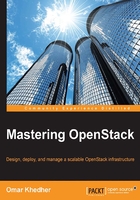
OpenStack – think again
Today, cloud computing is about Software as a Service (SaaS), Platform as a Service (PaaS), and Infrastructure as a Service (IaaS). The challenge that has been set by the public cloud is about agility, speed, and service efficiency. Most companies have expensive IT systems they have developed and deployed over the years, but they are siloed. In many cases, the IT systems are struggling to respond to the agility and speed of the public cloud services that are offered within their own private silos in their own private data center. The traditional data center model and siloed infrastructure might lead to unsustainability. In fact, today's enterprise data center focuses on what it takes to become a next-generation data center. The shift to the new data center generation has evolved the adoption of a model for the management and provision of software. This has been accompanied by a shift from workload isolation in the traditional model to a mixed model. With an increasing number of users utilizing cloud services, the next-generation data centers are able to handle multitenancy. The traditional one was limited to a single tenancy. Moreover, enterprises today look for scaling down next to scaling up. It is a huge step in the data center technology to shift the way of handling an entire infrastructure.
The big move to a software infrastructure has allowed administrators and operators to deliver a fully automated infrastructure within a minute. The next-generation data center reduces the infrastructure to a single, big, agile, scalable, and automated unit. The end result is that the administrators will have to program the infrastructure. This is where OpenStack comes into the picture—the next-generation data center operating system. The ubiquitous influence of OpenStack was felt by many big global cloud enterprises such as VMware, Cisco, Juniper, IBM, Red Hat, Rackspace, PayPal, and EBay, to name but a few. Today, many of them are running a very large scalable private cloud based on OpenStack in their production environment. If you intend to be a part of a winning, innovative cloud enterprise, you should jump to the next-generation data center and gain a valuable experience by adopting OpenStack in your IT infrastructure.
Note
To read more about the success stories of many companies, visit https://www.openstack.org/user-stories.